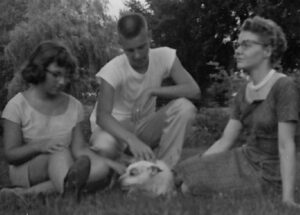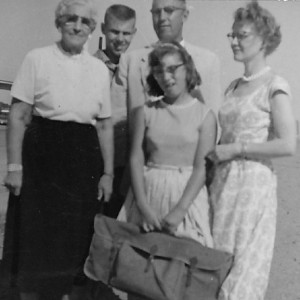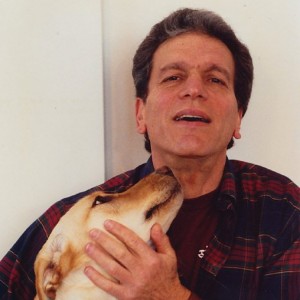 “I miss Dad,” I told Mom after my father died when I was 14. “I don’t know what to do.”
“I miss Dad,” I told Mom after my father died when I was 14. “I don’t know what to do.”
“I can’t talk about it,” Mom said. “I have to go to work. I don’t want to cry.”
My only brother returned to college while Mom withdrew into a shell of sorrow. I grieved alone.
No one shared funny or sad memories. No one discussed his absence or his suffering. There was no photo of Dad in our home. I remember his empty chair at the dining room table and the hollow feeling in my chest. I felt isolated and disconnected from my father, my family, and everyone. I had one girlfriend who understood I was grieving, but most didn’t know how to talk about it or offer comfort.
***
“Let’s not tell anyone until we know exactly what’s going on,” my husband Vic suggested when doctors suspected he had cancer in 2006.
“I can’t do that,” I said. “We need to tell our sons and friends. We don’t have to do this alone.”
Vic knew I was right and immediately agreed. Although we are all mortal, our culture teaches us to hide illness, death, and grief. Secrecy and shame make sorrow more painful and isolating.
After Vic’s death, my tears spilled out when a friend greeted me with tender eyes. Grief washed over me when I was alone. I had a therapist, close friends and loving sons, but still felt embarrassed by the intensity of my sorrow. I needed a new perspective.
“Grief is how loving her feels,” Paul Bennett wrote about his deceased wife in his book, Loving Grief. “My grief is . . . nothing more or less than my love for her.” I began to see my grief as another form of deep love, a normal longing for the presence of my husband or father. There was nothing to hide or fear.
When grief hit me in waves, I let it open my heart. It was only my love. Talking with others in bereavement groups brought relief and hope. I was not alone.
***
I’d love to hear about your experiences with bereavement support, especially things that helped you the most. For other posts about volunteer bereavement work, see Gifts of the Heart: Volunteering at Hospice. I facilitated Hospicare peer support groups for widows for a few years and also wrote for their newslatter. My book, Leaning Into Love: A Spiritual Journey through Grief, was published in 2014 and was the Gold Medal Winner for Independent Publisher’s Book Awards on Aging/Death, and Dying.


Lovely writing, as ever, Elaine. Paul Bennett’s book, Loving Grief, also helped me when Sam, the love of my life, died. My friend Carolyn Byerly sent the book to me a few weeks after the funeral. She knew Paul through Perry City Friends’. Knowing what I felt was an expression of my continuing love for Sam helped me through the roughest patches. And still does. Sharing grief lightens the burden of loss.
I’m forever grateful to Paul Bennett for his writing about this idea. Conceptually, I knew love must end in loss because we are mortal, but Bennett’s book helped me turn a concept into a heart experience. I could feel and name grief as the way my love needed to express itself. The idea soothed me and normalized my experience. I didn’t want to get over Vic. I wanted to keep loving him and let the loss transform and change me. It helped to share my loss with friends–and obviously it still does. The first time uyou and I met, we discussed Bennett’s book. An immediate shared connection around the loss of our partners.
What a wonderful thing you are doing Elaine for those who have loved and lost. Your lessons and words of encouragement in this field of bereavement are extra special because you don’t speak like a formal teacher or in the third person. You bring yourself into your writing and let people feel what you say and identify with you. You are truly inspirational, xo
Thank you, Debby. When I go into a teacherly voice, I put everyone to sleep. I proved that to myself in writing classes a few times. I’m better with personal writing and that’s your style, too. I enjoy writing and reading memoir more than how-to books. I appreciate your encouraging words.
Well keep it up and thanks for the recognition. It is funny while I have just finished revisions on my next book and part way through writing 2 others, I find that no matter my intended style to present my book, I always seem to have to be the one telling my own stories. I suppose that is just the type of writer I am.
Wow, I’m so tied up with one book, blogs, submissions, etc., I can’t get very far on my second book. Just an idea with about six pages written, and I’m not sure it’s the “right” idea. You are prolific!
Your work at Hospicare is such a gift to the grieving community, Elaine. I found much support in the Singing Grieving group that I participated in there. Sharing through art–writing and painting–also helps me through.
My friend is doing Hospicare volunteer training. She’s an artist and I imagine her leading a group there in painting, although I’m not sure she imagines that. Have you ever thought of that, Lynne. Thanks.
You have a more healthy outlet for expressing your grief than did your mother who withdrew into a shell of sorrow. In those days it was considered weak or overly emotional to show one’s true feelings–how sad for her and for the family.
Your sons look much like their father, especially Anthony.
Yes, Anthony looks very much like Vic, and they both have their dad’s curls. I feel so sad for my mother. As a child, I was just stunned and didn’t know any better. Then I became angry about it when I was in my twenties. She didn’t talk about her grief until she was diagnosed and already well into Alzheimer’s, but we shared our feelings then in the most healing way. She was hanging on my her fingernails with no net and no strong community of support except her own parents who also believed in hiding grief. So we learn, we love, and we forgive. Thank you for your keen observation, Marian.
Thanks for reminding me of Paul Bennett’s Book and his view on grieving and loving. And thank you for being an inspiration to me. I am starting my Hospicare training next week. Cheers!
Wonderful Robin. I had no idea. I know another woman in this class of volunteers. I think you know her, too, because the three of us met in the patient kitchen on the oncology ward. Paul Bennett’s idea turned me in the right direction. We’ll all feel better once the earth turns green.
Elaine,
I love the picture of Vic and Daisy. Both gone now.
Your writing always causes me to pause and think and figure out where I am on my own grief journey.
Too many losses to name here. But here are the lines that stand out for me: “Although we are all mortal, our culture teaches us to hide illness, death, and grief. Secrecy and shame make sorrow more painful and isolating.”
I’m looking forward to reading your book this fall.
xoxoxo
Kathleen
Thank you, Kathleen. I look forward to that time myself, although I’m told I’ll be busier than I am now with book work. Yikes!
I’ll go to sleep tonight with your sweet message in my thoughts.
I imagine you warm. It’s been a harsh winter here. Ready for daffodils.
Love,
Elaine
Beautiful post Elaine thank you. What an enlightening perspective to see grief felt is as love felt. Thank you.
Thank you, Susan. That idea hit me deeply and changed my judgment that I “shouldn’t” grieve or at least I should hide it. It allowed me to be honest with true feelings instead of going underground.
“Grief is another form of love”: so true
Thanks for commenting, Luisa. Once I saw grief through this lens, it normalized the experience. The US is one of the few cultures where we’re taught to hide grief instead of honoring our losses.